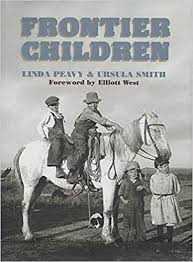Frontier Children
Listen to the Recess! Clip
| Author | Rita Smith |
| Air Date | 3/23/2004 |

Frontier Children Transcript
In the second half of the 19th century, the prevailing view of the ideal Victorian child was someone who could enjoy a life of carefree happiness before coming of age and taking on adult responsibilities, but for thousands of children who accompanied their parents on the overland trails to homesteads in Oregon, California or the great plains, this ideal underwent speedy and necessary revision.
The journey began with both excitement and sorrow for children: the excitement of a new adventure, often with an entire town turning out to see the family off, and the sorrow of leaving behind friends, grandparents, and beloved pets. In their book, Frontier Children, Linda Peavy and Ursula Smith relate how George Jackson of Hazelton, Iowa, could not hide his tears one spring morning in 1880 when the family loaded the wagon and headed west toward Montana. Jake, George’s old black cat, walked beside them to the very end of the farmyard fence where he sat down, and watched them go for as long as George could see him.1
From day one all children performed daily chores. They herded the family cattle behind the wagon. They gathered wood, buffalo dung, or tall prairie grass which they twisted into coils for the evening campfire. They tended the chickens, fished when they came to a river and hunted when small game was available. Girls cooked and sewed, and cared for younger children as well as the sick and injured. They contracted the usual childhood diseases, chicken pox and measles, made more life threatening by poor diet, exhaustion and exposure inhospitable weather. There were boundless opportunities for accidents. Children wandered away, drowned, fell off the wagon and were run over. Many of the children walked all the way, often barefoot. As an adult, Benjamin Bonney recalled the agony he and his siblings experienced as they limped across the desert, the soles of their feet cut and bleeding from the fallen needles of the prickly pear.2
But there were fun things for children as well, which they talk about in their letters to friends back east and in their reminiscences as adults. There were wonderful evenings around the campfire listening to and telling stories. They played games and read books. Ten year old Molly Sheehan recalled the pleasure of reading Uncle Tom’s Cabin in the evening by the light of the campfire. They rode horses and swam in streams. They were not too young to appreciate the mountain scenery, the wildflowers, and the wide open spaces.
As with so many others throughout history, these children were swept along in a family decision in which they had no say. For some it was a wonderful adventure; for some it was a terrible trial, but for all who survived, it was a singular undertaking that altered their view of life forever.
Notes
1 Peavy, p. 18.
2 Ibid.
Sources:
Peavy, Linda and Ursula Smith. Frontier Children. Norman, Okla. : University of Oklahoma Press, c1999.
Stefoff, Rebecca. Children of the Westward Trail. Brookfield, Conn. : Millbrook Press, c1996.